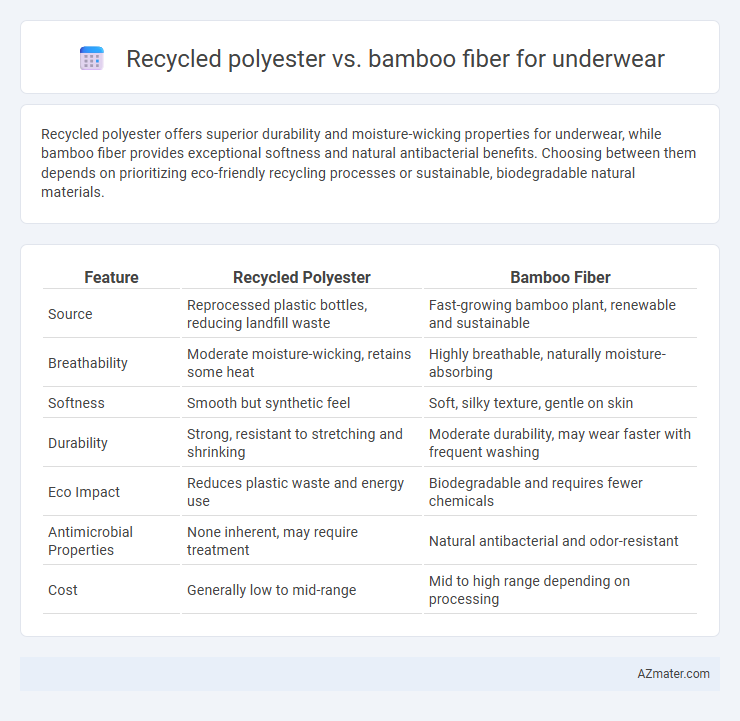Recycled polyester offers superior durability and moisture-wicking properties for underwear, while bamboo fiber provides exceptional softness and natural antibacterial benefits. Choosing between them depends on prioritizing eco-friendly recycling processes or sustainable, biodegradable natural materials.
Table of Comparison
| Feature | Recycled Polyester | Bamboo Fiber |
|---|---|---|
| Source | Reprocessed plastic bottles, reducing landfill waste | Fast-growing bamboo plant, renewable and sustainable |
| Breathability | Moderate moisture-wicking, retains some heat | Highly breathable, naturally moisture-absorbing |
| Softness | Smooth but synthetic feel | Soft, silky texture, gentle on skin |
| Durability | Strong, resistant to stretching and shrinking | Moderate durability, may wear faster with frequent washing |
| Eco Impact | Reduces plastic waste and energy use | Biodegradable and requires fewer chemicals |
| Antimicrobial Properties | None inherent, may require treatment | Natural antibacterial and odor-resistant |
| Cost | Generally low to mid-range | Mid to high range depending on processing |
Introduction to Sustainable Underwear Materials
Recycled polyester offers durability and moisture-wicking properties, making it a prevalent choice for sustainable underwear designed to reduce plastic waste. Bamboo fiber provides natural antibacterial qualities and biodegradability, enhancing comfort while minimizing environmental impact. Both materials contribute to eco-friendly underwear options, balancing performance with sustainability goals.
What is Recycled Polyester?
Recycled polyester is a sustainable fabric made from repurposed plastic waste, primarily PET bottles, which reduces landfill impact and lowers carbon emissions compared to virgin polyester. This material retains the durability, moisture-wicking properties, and quick-drying capabilities essential for comfortable underwear, making it a practical choice for eco-conscious consumers. Bamboo fiber, while also eco-friendly, differs by offering natural antibacterial qualities and exceptional softness but may lack the stretch and resilience found in recycled polyester blends.
What is Bamboo Fiber?
Bamboo fiber is a natural textile derived from bamboo pulp, renowned for its softness, breathability, and moisture-wicking properties, making it ideal for underwear. Unlike recycled polyester, which is a synthetic fabric created from repurposed plastic bottles, bamboo fiber is biodegradable and eco-friendly, reducing environmental impact during production and disposal. Its natural antibacterial qualities help minimize odors, enhancing comfort and hygiene in undergarments.
Environmental Impact: Production and Processing
Recycled polyester production significantly reduces plastic waste and lowers energy consumption compared to virgin polyester, but it still relies on petroleum-based materials and can release microplastics during washing. Bamboo fiber, derived from fast-growing bamboo plants, offers a renewable resource with natural antibacterial properties, yet its environmental benefits depend heavily on the chemical-intensive process used to convert bamboo into soft fabric. Both materials present trade-offs, with recycled polyester prioritizing circular waste management and bamboo fiber emphasizing sustainable raw material growth, but processing methods greatly influence their overall ecological footprint.
Comfort and Breathability Comparison
Recycled polyester offers durability and moisture-wicking properties, making it effective at keeping skin dry during physical activities, but it can retain heat and reduce breathability compared to natural fibers. Bamboo fiber, known for its exceptional softness and natural breathability, provides superior comfort by allowing better air circulation and moisture absorption, which helps prevent irritation and odor. When prioritizing underwear comfort and breathability, bamboo fiber generally outperforms recycled polyester, especially in terms of softness and temperature regulation.
Durability and Longevity
Recycled polyester offers superior durability and longevity compared to bamboo fiber, making it ideal for underwear that withstands frequent wear and washing. The synthetic composition of recycled polyester resists stretching and pilling, ensuring sustained shape and fabric integrity over time. Bamboo fiber, although soft and breathable, tends to degrade faster under repeated laundering and is more prone to fabric thinning and wear.
Moisture-Wicking and Odor Control
Recycled polyester outperforms bamboo fiber in moisture-wicking due to its hydrophobic properties that actively pull sweat away from the skin, ensuring faster drying times and enhanced comfort during prolonged wear. Bamboo fiber offers natural antibacterial qualities that help reduce odor-causing bacteria but tends to retain more moisture, which can limit its effectiveness in high-intensity activities. For underwear focused on moisture management and odor control, recycled polyester provides superior performance in dryness and durability, while bamboo fiber excels in natural odor resistance and eco-friendliness.
Skin Sensitivity and Allergen Considerations
Recycled polyester offers moisture-wicking properties but may cause irritation for sensitive skin due to its synthetic nature and potential chemical residues. Bamboo fiber is naturally hypoallergenic and breathable, making it ideal for individuals with skin sensitivities or allergies. Choosing bamboo fiber underwear reduces the risk of allergic reactions and promotes skin comfort through its antimicrobial and moisture-absorbing qualities.
Price and Accessibility
Recycled polyester underwear offers a cost-effective option due to its mass production and availability from post-consumer plastics, making it widely accessible in mainstream markets. Bamboo fiber underwear, while often marketed as eco-friendly and biodegradable, typically comes at a higher price point because of more complex processing and smaller production scale. Consumers seeking affordability and easy purchase options generally find recycled polyester products more accessible, whereas bamboo fiber garments appeal to niche markets prioritizing natural materials.
Which Fabric is More Sustainable for Underwear?
Recycled polyester, made from post-consumer plastic bottles, reduces landfill waste and lowers carbon emissions compared to virgin polyester, making it a sustainable choice for underwear. Bamboo fiber is biodegradable and requires less water and pesticides for cultivation, but its sustainability depends heavily on the chemical-intensive processing methods often used to turn bamboo into fabric. Choosing sustainable underwear depends on balancing reduced plastic pollution through recycled polyester against the eco-friendly cultivation benefits of bamboo fiber with careful consideration of production practices.

Infographic: Recycled polyester vs Bamboo fiber for Underwear
 azmater.com
azmater.com